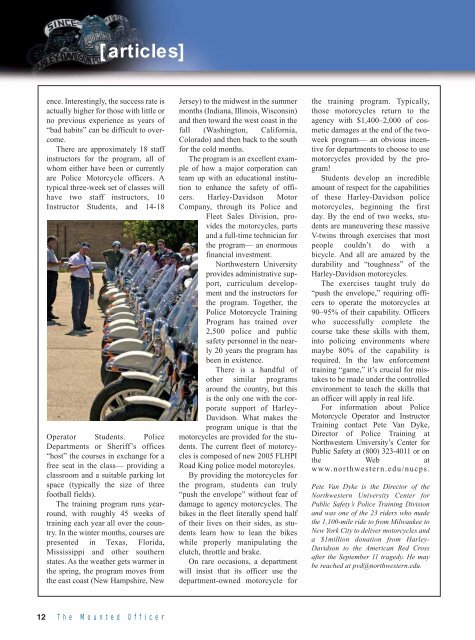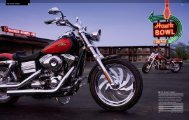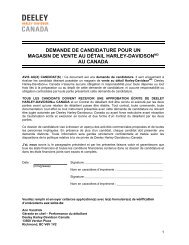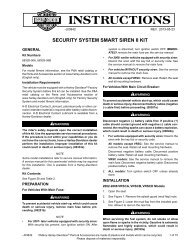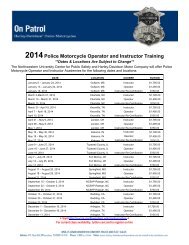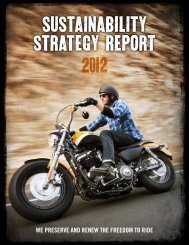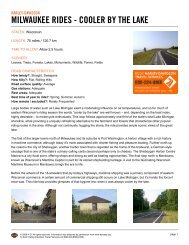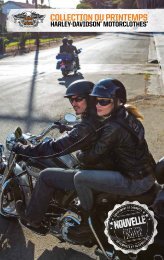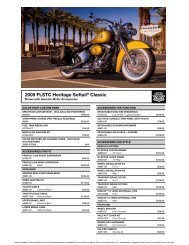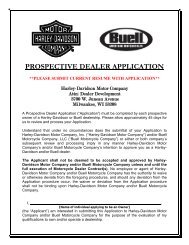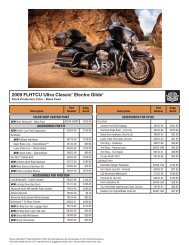Development of Anti-Lock Brake System - Harley-Davidson
Development of Anti-Lock Brake System - Harley-Davidson
Development of Anti-Lock Brake System - Harley-Davidson
You also want an ePaper? Increase the reach of your titles
YUMPU automatically turns print PDFs into web optimized ePapers that Google loves.
[articles]<br />
ence. Interestingly, the success rate is<br />
actually higher for those with little or<br />
no previous experience as years <strong>of</strong><br />
“bad habits” can be difficult to overcome.<br />
There are approximately 18 staff<br />
instructors for the program, all <strong>of</strong><br />
whom either have been or currently<br />
are Police Motorcycle <strong>of</strong>ficers. A<br />
typical three-week set <strong>of</strong> classes will<br />
have two staff instructors, 10<br />
Instructor Students, and 14-18<br />
Operator Students. Police<br />
Departments or Sheriff’s <strong>of</strong>fices<br />
“host” the courses in exchange for a<br />
free seat in the class— providing a<br />
classroom and a suitable parking lot<br />
space (typically the size <strong>of</strong> three<br />
football fields).<br />
The training program runs yearround,<br />
with roughly 45 weeks <strong>of</strong><br />
training each year all over the country.<br />
In the winter months, courses are<br />
presented in Texas, Florida,<br />
Mississippi and other southern<br />
states. As the weather gets warmer in<br />
the spring, the program moves from<br />
the east coast (New Hampshire, New<br />
Jersey) to the midwest in the summer<br />
months (Indiana, Illinois, Wisconsin)<br />
and then toward the west coast in the<br />
fall (Washington, California,<br />
Colorado) and then back to the south<br />
for the cold months.<br />
The program is an excellent example<br />
<strong>of</strong> how a major corporation can<br />
team up with an educational institution<br />
to enhance the safety <strong>of</strong> <strong>of</strong>ficers.<br />
<strong>Harley</strong>-<strong>Davidson</strong> Motor<br />
Company, through its Police and<br />
Fleet Sales Division, provides<br />
the motorcycles, parts<br />
and a full-time technician for<br />
the program— an enormous<br />
financial investment.<br />
Northwestern University<br />
provides administrative support,<br />
curriculum development<br />
and the instructors for<br />
the program. Together, the<br />
Police Motorcycle Training<br />
Program has trained over<br />
2,500 police and public<br />
safety personnel in the nearly<br />
20 years the program has<br />
been in existence.<br />
There is a handful <strong>of</strong><br />
other similar programs<br />
around the country, but this<br />
is the only one with the corporate<br />
support <strong>of</strong> <strong>Harley</strong>-<br />
<strong>Davidson</strong>. What makes the<br />
program unique is that the<br />
motorcycles are provided for the students.<br />
The current fleet <strong>of</strong> motorcycles<br />
is composed <strong>of</strong> new 2005 FLHPI<br />
Road King police model motorcyles.<br />
By providing the motorcycles for<br />
the program, students can truly<br />
“push the envelope” without fear <strong>of</strong><br />
damage to agency motorcycles. The<br />
bikes in the fleet literally spend half<br />
<strong>of</strong> their lives on their sides, as students<br />
learn how to lean the bikes<br />
while properly manipulating the<br />
clutch, throttle and brake.<br />
On rare occasions, a department<br />
will insist that its <strong>of</strong>ficer use the<br />
department-owned motorcycle for<br />
the training program. Typically,<br />
those motorcycles return to the<br />
agency with $1,400–2,000 <strong>of</strong> cosmetic<br />
damages at the end <strong>of</strong> the twoweek<br />
program— an obvious incentive<br />
for departments to choose to use<br />
motorcycles provided by the program!<br />
Students develop an incredible<br />
amount <strong>of</strong> respect for the capabilities<br />
<strong>of</strong> these <strong>Harley</strong>-<strong>Davidson</strong> police<br />
motorcycles, beginning the first<br />
day. By the end <strong>of</strong> two weeks, students<br />
are maneuvering these massive<br />
V-twins through exercises that most<br />
people couldn’t do with a<br />
bicycle. And all are amazed by the<br />
durability and “toughness” <strong>of</strong> the<br />
<strong>Harley</strong>-<strong>Davidson</strong> motorcycles.<br />
The exercises taught truly do<br />
“push the envelope,” requiring <strong>of</strong>ficers<br />
to operate the motorcycles at<br />
90–95% <strong>of</strong> their capability. Officers<br />
who successfully complete the<br />
course take these skills with them,<br />
into policing environments where<br />
maybe 80% <strong>of</strong> the capability is<br />
required. In the law enforcement<br />
training “game,” it’s crucial for mistakes<br />
to be made under the controlled<br />
environment to teach the skills that<br />
an <strong>of</strong>ficer will apply in real life.<br />
For information about Police<br />
Motorcycle Operator and Instructor<br />
Training contact Pete Van Dyke,<br />
Director <strong>of</strong> Police Training at<br />
Northwestern University’s Center for<br />
Public Safety at (800) 323-4011 or on<br />
the Web at<br />
www.northwestern.edu/nucps.<br />
Pete Van Dyke is the Director <strong>of</strong> the<br />
Northwestern University Center for<br />
Public Safety’s Police Training Division<br />
and was one <strong>of</strong> the 23 riders who made<br />
the 1,100-mile ride to from Milwaukee to<br />
New York City to deliver motorcycles and<br />
a $1million donation from <strong>Harley</strong>-<br />
<strong>Davidson</strong> to the American Red Cross<br />
after the September 11 tragedy. He may<br />
be reached at pvd@northwestern.edu.<br />
12 T h e M o u n t e d O f f i c e r


